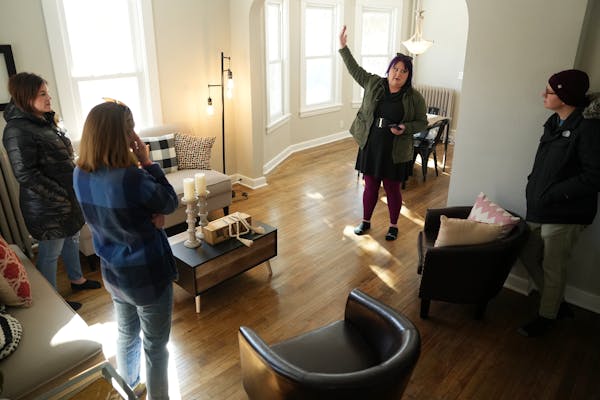Buying a house isn't easy, especially for the first time.
Just ask John Sibilia, who recently experienced all the stress and uncertainty many first-time homebuyers face.
Another buyer outbid him on one house. He had to back out of a purchase agreement on another. But then his luck suddenly turned after seeing a house in West St. Paul that had just hit the market for $225,000.
He made an offer the same day, closed quickly, and less than a month after first setting foot in it, he and his dog, Gunnar, were home.
"I don't regret it at all," Sibilia said. "But I'm happy it's over."
Though Sibilia closed on the house in near-record speed, his path to homeownership started months before that.
Here's advice all first-time homebuyers need as the spring market gains traction.
Build a trusted team
Sibilia found Twin Cities agent Mark Philion from a referral while house-hunting on Realtor.com. Sibilia said it was a rock-solid connection because he soon sensed Philion was on his side, helping steer him away from at least one house bound to become a money pit.
Many buyers hire a friend or acquaintance, but you might want to consider someone who specializes in the communities where you want to live.
Here's why: Though the market has cooled, there are still some areas where there are more buyers than sellers. In some cases, that makes it important to hire an agent who's well-connected in those neighborhoods. Those agents often hear about houses that are soon to hit the market.
Meeting with a loan officer before starting to shop is also essential to help understand your budget and secure a preapproval letter.
"If Sibilia didn't have all his financial tools lined up, and he went into the fight with one hand behind his back," Philion said, "he wasn't as strong of a buyer as he could [have been]."
Be realistic
HGTV bills many of its programs as reality shows, but in many cases, what you're watching isn't realistic, especially for first-time buyers on a budget.
A survey of house listings priced under $300,000 show many are smaller than 1,000 square feet, have only one or two bedrooms and just a single bathroom.
Sibilia's one-bedroom house is more than 100 years old and is far from perfect, but he doesn't care. The house has two finished rooms upstairs and space to add a second bath, making it what Sibilia called an "equity builder." He loves that it has a one-car garage and fenced backyard, things he wouldn't likely have if he continued renting.
Set a budget, spend less
Once you set a budget, try to still shop for houses that cost less than your max. That's so you have the flexibility to offer sellers more than they're asking.
Philion said Sibilia shopped for houses priced at about 25% less than he could afford. That's because about half the houses Philion's first-timers want to buy elicit more than one offer and often sell for more than asking.
So when Sibilia decided to make an offer the first day his house hit the market, he was able to offer the sellers extra, making it easier for them to accept before others could see the house and give more competition. There were eight showings set up for that day, 12 for the next day and a weekend open house.
"The last thing I wanted was for that house to go to an open house," Philion said. "John wouldn't have got it."
Check out homebuyer assistance programs
Federal Housing Administration mortgages are well-suited to first-time buyers because they require a smaller down payment. But there are a variety of homebuyer assistance programs.
Sibilia was able to qualify for a deferred loan to help cover his down payment and closing costs through Minnesota Housing's Homeownership Program. He qualified for a $12,500 loan he doesn't have to pay back until he sells the house or pays off the loan.
That means he only had to pay about $1,575 out of pocket to buy the house.
Consider a townhouse or condo
Condos and townhouses generally cost significantly less than single-family houses. The median price of a condo was $199,900 during February, about $200,000 less than a single-family house, according to the Minneapolis Area Realtors (MAR).
At the end of the year, 27 of the 37 properties listed for under $100,000 were condos. Philion notes while condos and townhouses come with association dues, the total cost of owning can still be cheaper than renting.
Know your neighborhoods
Find out which communities have the most affordable houses. You can shop online without obligation on Realtor.com and other real estate websites.
But you can also check the Star Tribune's interactive database below, which shows the share of starter homes — in all cities with at least 20 new listings — priced at sub-$300,000 last year. Brooklyn Center, South St. Paul and Columbia Heights had the highest share of entry-level houses in 2022, making them great places for first-time buyers.
Do an independent home inspection
Last year when the market was so competitive, buyers waived financing and inspection contingencies to help make their offers appealing. That's no longer the case.
Sibilia put in an offer on a South St. Paul house, and Philion encouraged him to hire an independent home inspector. It's good he did. The house needed $30,000 to $40,000 in foundation repairs. Without the inspection, Sibilia said, "I would have been up a creek without a paddle."
Ask the seller to contribute
Many buyers are asking sellers to chip in for repairs, closing costs and mortgage-rate buy downs, all of which are seller concessions that accounted for nearly 46% of all deals last month, according to Redfin. Because Sibilia paid nearly $10,000 more than the asking price, Philion asked the sellers to help pay some of the closing costs to offset.
Don't dilly-dally
Though houses are now taking longer to sell, there's still a dire shortage of ones that are affordable to entry-level buyers. And many are selling quickly.
On average, houses priced from $250,000 to $350,000 sold in just 27 days last month. That was five days faster than last year at the same time and swifter than any other price range, according to MAR.
The bottom line
Many experts said the best time to buy a house is when you can afford it, so don't fret about trying to time the market.
Yes, mortgage rates are higher than last year, but you can always refinance if rates decline. If you're worried there aren't enough listings, you don't know what's really out there until you start looking.
And if you're concerned about buying during the market's peak, all the latest surveys show if year-over-year prices decline — and they are in some parts of the country — they're likely to decrease far less in the Twin Cities because prices rose much more modestly than most of the nation.
Philion's advice is to start the process six months before you want to buy. And if the prospect of competing with other buyers has you waiting on the sidelines, consider shopping from December through February, when there are fewer buyers in the market and sellers are the most serious.
"That's when sellers really want to sell," he said. "And for buyers, home ownership is the No. 1 wealth builder, so why wait?"
Minnesota's med spa industry rises in popularity — and with little regulation

Ramstad: Readers say Walmart won't be paying the ultimate price of Trump's tariffs

How Minnesota businesses can spot and prevent invoice fraud
No place for cryptocurrency in retirement portfolios



